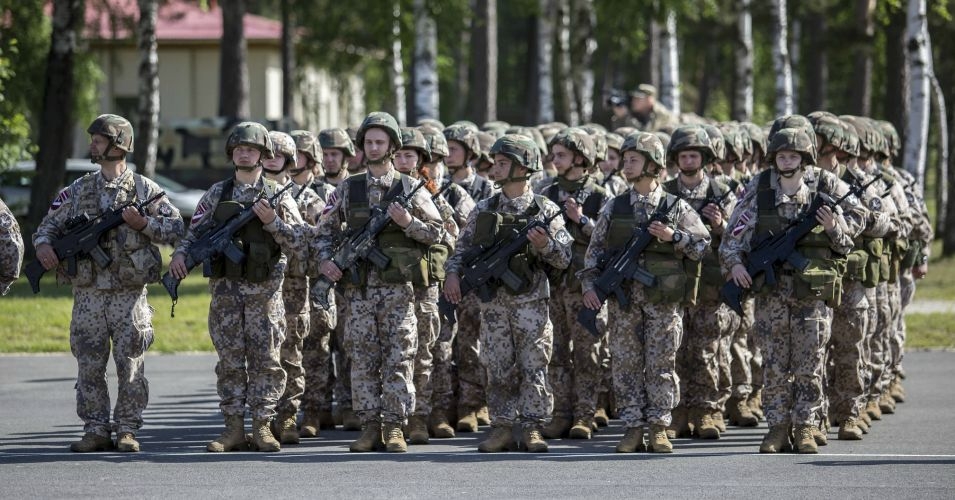The nature and scale of ongoing exercises suggest ‘Russia is preparing for a conflict with NATO, and NATO is preparing for a possible confrontation with Russia.’
Written by Deirdre Fulton, staff writer for Common Dreams. Published 8-12-15.
War games conducted by Russian and NATO forces go far beyond the hypothetical, raising the specter of a very real conflict on the European continent, a new study warns.
According to the European Leadership Network (ELN), a think tank based in London, “[o]ver the last 18 months, against the backdrop of the war in Ukraine, the relationship between Russia and the West has deteriorated considerably”—at least in part due to war games that feed a “climate of mistrust.”
ELN’s report, Preparing for the Worst: Are Russian and NATO Military Exercises Making War in Europe more Likely? (pdf), analyzes a Russian ‘snap exercise’ in March involving 80,000 military personal from bases all across the country, and NATO’s Allied Shield set of war games conducted on air, land, and sea in June, which involved 15,000 personnel from 22 countries.
Though both sides “may maintain that these operations are targeted against hypothetical opponents, the nature and scale of them indicate otherwise: Russia is preparing for a conflict with NATO, and NATO is preparing for a possible confrontation with Russia,” the authors write.
NATO’s activities, for example, are “clearly intended to simulate the kinds of operations NATO forces would need to engage in, in the context of a military crisis or confrontation with Russia somewhere in the Baltic region,” the report reads, while the scale and geographical distribution of Russia’s drill “means it could only have been a simulated war with U.S.-led NATO.”
“We do not suggest that the leadership of either side has made a decision to go to war or that a military conflict between the two is inevitable,” the report continues, “but that the changed profile of exercises is a fact and it does play a role in sustaining the current climate of tensions in Europe.”
The exercises also indicate “what each side sees as its most exposed areas,” ELN states, with NATO concentrating its activities in the Baltic States and Poland and Russia focusing primarily on the Arctic and High North, the seaport city of Kaliningrad, occupied Crimea, and its border areas with NATO members Estonia and Latvia.
While Russia and NATO both insist that their moves are defensive in nature, the authors argue that war games can be easily perceived “as provocative and deliberate aggravation of the crisis.”
To “defuse or at least minimize the tensions” between the world powers, the report recommends increased transparency and communication around scheduling of exercises; “restraint in terms of size or scenarios used in exercises;” and—most grandly—the immediate commencement of “conceptual work” on a new treaty limiting deployment of specific categories of weapons.
This work is licensed under a Creative Commons Attribution-Share Alike 3.0 License.



![Image By Peter Fitzgerald (:Image:Ukraine regions map.svg) [GFDL (http://www.gnu.org/copyleft/fdl.html) or CC-BY-SA-3.0-2.5-2.0-1.0 (http://creativecommons.org/licenses/by-sa/3.0)], via Wikimedia Commons](http://occupyworldwrites.org/wp-content/uploads/2014/03/1024px-Ukraine_regions_map-300x203.png)
![United States President Barack Obama and Russian President Vladimir Putin walk to the G8 Summit dinner following their bilateral meeting in Ireland on 17 June 2013. Photo by Pete Souza [Public domain], via Wikimedia Commons](http://occupyworldwrites.org/wp-content/uploads/2014/03/Barack_Obama_and_Vladimir_Putin_walking_in_Ireland-300x221.jpg)
![Events in Kiev on 2-18-14. Photo By Mstyslav Chernov/Unframe/http://www.unframe.com/ (Own work) [CC-BY-SA-3.0 (http://creativecommons.org/licenses/by-sa/3.0)], via Wikimedia Commons](http://occupyworldwrites.org/wp-content/uploads/2014/03/1024px-Clashes_in_Kyiv_Ukraine._Events_of_February_18_2014-4-300x200.jpg)